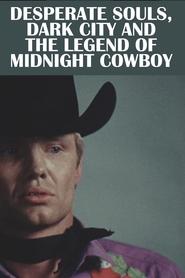Seattle International Film Festival 2023: Film #10
The thing that lingered on my mind when leaving the cinema was that the first post-movie white-on-black "Where Are They Now?" title remarked that, on a budget of $3.2m, Midnight Cowboy recouped a whopping $44.8m. This struck me as a very curious (and slightly myopic) vindication of the movie to conclude with; at odds with Desperate Souls'… central thesis that Midnight Cowboy had a social—and not economic—impact.
Still, when you make a documentary about the social impact of one of the greatest American movies of all time, you're pretty much playing with the house's money. And, as a fan of Midnight Cowboy, I was thus already inclined to like this broad social documentary. Trying to critique it more 'objectively', however, there's some very weak initial close-up camerawork (due to Jon Voight constantly moving out of the lens' shallow focal depth), and, more broadly, given that Desperate Souls'… was touted to explore NYC in a troubled era of cultural ferment and social change in a novel manner, it did not advance a view of the '1960s counterculture', the 'Times Square of old' and the 'Western film genre' that cannot be found in any mainstream book on American film history. Saying that, however, I loved the cameo from Village Voice's J. Hoberman and the implicit visual suggestion that John Wayne's off- and on-screen persona—especially the one seen in John Ford's The Searchers (1956)—can be indirectly linked to Lieutenant Colonel Bill "I Love the Smell of Napalm in the Morning" Kilgore in Francis Ford Coppola's Apocalypse Now (1979).
Synopsis: This is not a documentary about the making of Midnight Cowboy. It is about a humane and groundbreaking masterpiece and the flawed but gifted people who made it. It is about a troubled era of cultural ferment, social and political change, about broken dreams and strivers, then and now. It is about an era that made a movie and a movie that made an era.

